Motivations for
learning English as an adult

Teaching English to adults is a unique and rewarding experience. Unlike children, adult learners come with clear motivations, specific goals, and life experiences that shape how they approach learning. As teachers, understanding these motivations and expectations is key to helping them succeed. In this article, we’ll explore why adults learn English, how personal factors can affect their learning, and how you can use this knowledge to plan and teach effectively.
- Motivations for learning English as an adult
Why do adults learn English? Understanding their motivations
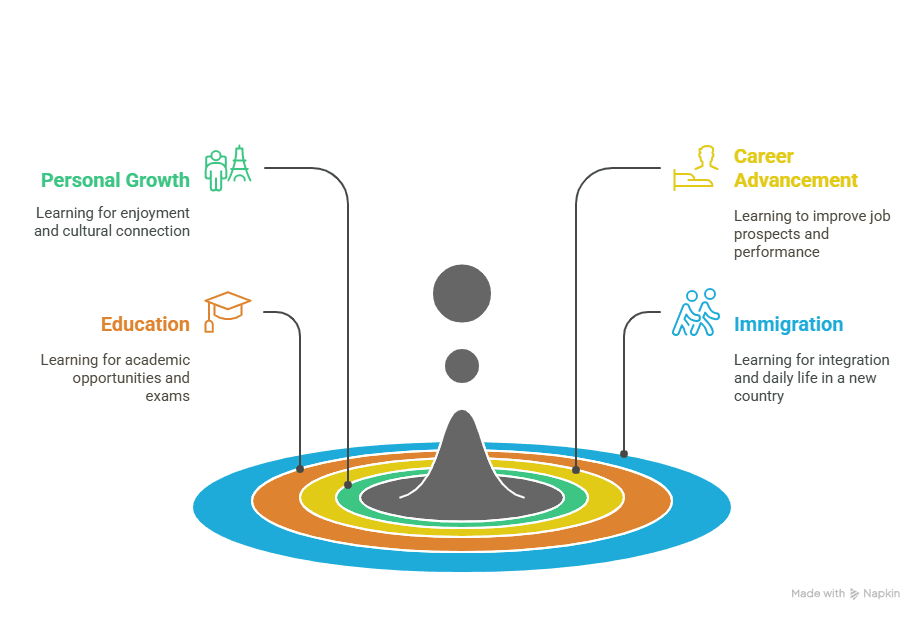
Adults learn English for a variety of reasons, and their motivations often influence how they engage in class. Here are some common reasons:
Personal growth:
For many adults, learning English is not necessarily tied to career advancement or academic goals, but rather driven by a desire for personal growth. This motivation stems from the joy of learning, the curiosity about the world, or the wish to engage more deeply with other cultures. These learners are not just focused on acquiring a new skill—they are looking to enrich their lives, expand their horizons, and cultivate a sense of accomplishment and confidence.
Imagine a retired teacher from Italy who has spent her life educating others. Now, in her retirement, she finds herself with more time and a deep desire to explore the world in ways she couldn’t during her working years. She’s always loved the idea of travelling, but instead of sticking to popular tourist areas, she wants to have more meaningful interactions with locals in their own language. For this teacher, learning English represents more than just mastering a global language—it’s a means of connecting with people from different cultures, understanding their worldviews, and forming friendships that transcend borders.
Career advancement:
For many adults, learning English is a pathway to better job opportunities or improving their performance in their current positions. English has become a global language of business, medicine, and technology, meaning that for many professionals, proficiency in English is no longer just an asset but a necessity.
Take, for example, a nurse from the Philippines who dreams of advancing her career by working in the UK or the U.S. To be successful in these countries, she must not only meet specific qualifications but also demonstrate proficiency in English. Her motivation is driven by the desire to move forward in her profession and provide a better life for herself and her family.
Education:
Education is another significant motivator for adults learning English, particularly for those who aspire to study at English-speaking universities or need to take internationally recognized exams like IELTS or TOEFL. In these cases, English proficiency is a requirement not just for academic success but for gaining acceptance into competitive programs.
For example, a Chinese student might need to achieve a high IELTS score to secure admission into a prestigious university in Australia. This score is not just a reflection of their language ability, but also a critical element in their academic future. The student’s motivation is driven by their desire to pursue higher education and open up new career opportunities that a degree from an English-speaking institution can provide. Beyond the exam, the student will need to learn how to adapt to studying in an English-speaking environment, where they will need to understand lectures, complete assignments in English, and interact with peers and professors.
Immigration:
For some adults, the motivation to learn English comes from the need to integrate into an English-speaking country after immigration. When moving to a new country, especially one where English is the primary language, learning the language becomes essential not just for work but for daily life and social integration.
Consider the example of a Syrian refugee settling in Canada. As he tries to adjust to his new life, English is necessary to navigate a wide range of daily tasks, from getting directions to understanding public services and healthcare information. Without proficiency in English, even the most basic activities, such as shopping, attending appointments, or finding housing, can become overwhelming. Beyond survival, English is also key to building a sense of belonging and participating fully in the community.
A real-world example:
In a class of adult learners, you might have a mix of motivations. One student might be a doctor preparing for a medical licensing exam in the U.S., while another might be a mother who wants to help her children with their English homework.
How personal factors affect learning
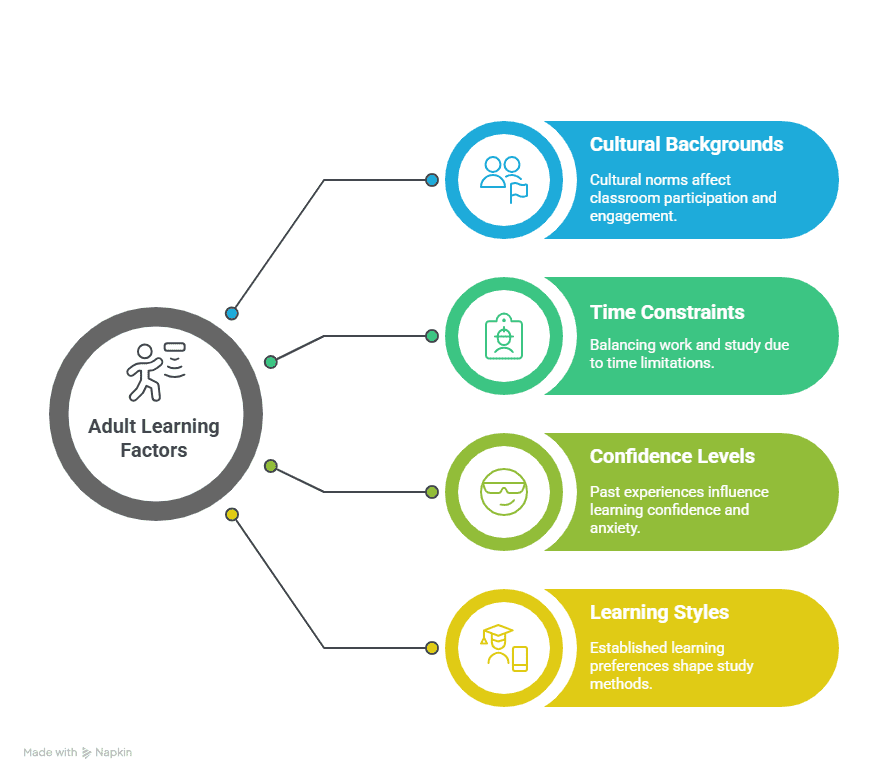
Adult learners bring more than just motivations to the classroom—they also bring personal factors that can impact their learning. These include:
Cultural backgrounds: As discussed in the previous lesson, cultural norms can influence how adults participate in class. A student from a culture that values humility might hesitate to speak up, even if they know the answer.
Time constraints: Many adults juggle work, family, and other responsibilities. A single parent working two jobs might struggle to find time to study, while a busy executive might only be able to attend class once a week.
Confidence levels: Past experiences, both positive and negative, can affect how confident adults feel about learning. A student who failed English in school might feel anxious, while someone who’s good at languages might feel more confident.
Learning styles: Adults often have established ways of learning. For example, a visual learner might prefer diagrams and videos, while an auditory learner might benefit more from listening to podcasts or discussions.
A real-world example:
A 45-year-old student who hasn’t studied in 20 years might feel overwhelmed by technology like online learning platforms, while a younger student might find it second nature.
Understanding students’
motivation to plan and teach effectively
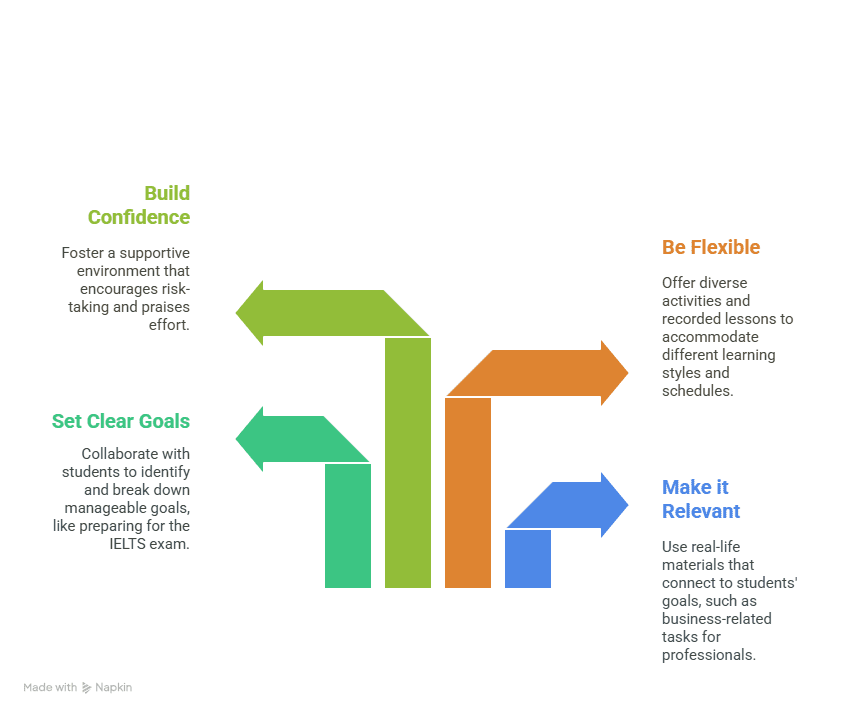
Understanding your students’ motivations and personal factors allows you to tailor your teaching to their needs. Here’s how:
Make it relevant: Use real-life materials that connect to students’ goals. For a business professional, this might mean practicing email writing or giving presentations.
Set clear goals: Work with students to identify their goals and break them into manageable steps. For example, if a student wants to pass the IELTS exam, focus on the skills they need to improve, like writing or speaking.
Be flexible: Offer a mix of activities to cater to different learning styles and schedules. For instance, provide recorded lessons for students who can’t attend live classes.
Build confidence: Create a supportive environment where mistakes are seen as part of the learning process. Praise effort, not just accuracy, and encourage students to take risks.
A real-world example:
If you have a class of immigrants, you could role-play scenarios like visiting a doctor or applying for a job. This makes the learning practical and immediately useful.
Keeping students motivations high and
meeting their expectations
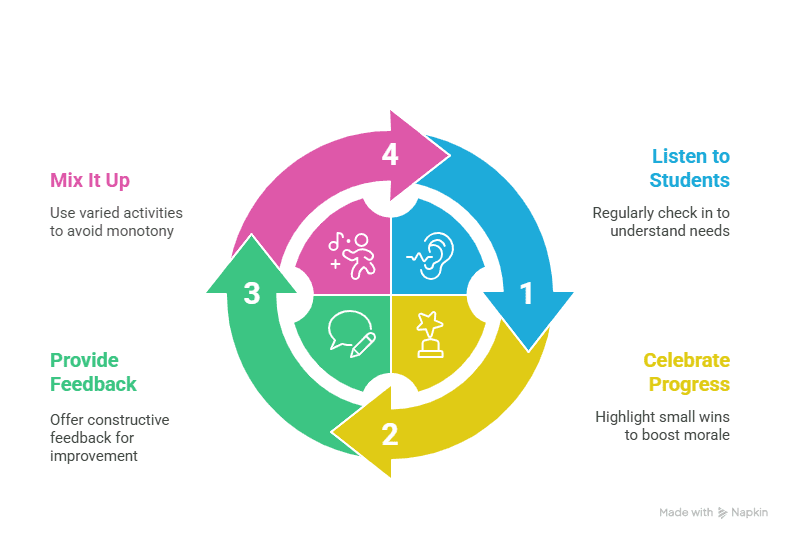
Motivation can wane over time, especially when progress feels slow. Here’s how to keep students engaged:
Listen to students: Regularly check in with students to understand their needs and adjust your teaching accordingly.
Celebrate progress: Highlight small wins, like mastering a difficult grammar rule or having a successful conversation in English.
Provide feedback: Give constructive feedback that helps students see where they’re improving and what they need to work on.
Mix it up: Avoid monotony by using a variety of activities, such as games, group work, and multimedia resources.
A real-world example:
A student who’s struggling with pronunciation might feel discouraged. By showing them how much they’ve improved over time—perhaps by comparing recordings of their speech from the start of the course to now—you can boost their confidence and motivation.
Final thoughts
Teaching English to adults is about more than just grammar and vocabulary—it’s about understanding their motivations, respecting their personal circumstances, and helping them achieve their goals. By doing this, you’ll not only help them learn English but also build their confidence and make the learning experience enjoyable.
So, the next time you step into a classroom, take a moment to connect with your students and understand what drives them. After all, their success is your success too!
A CELTA trainee’s perspective
Reflecting on learner motivations: Who might be the most challenging?
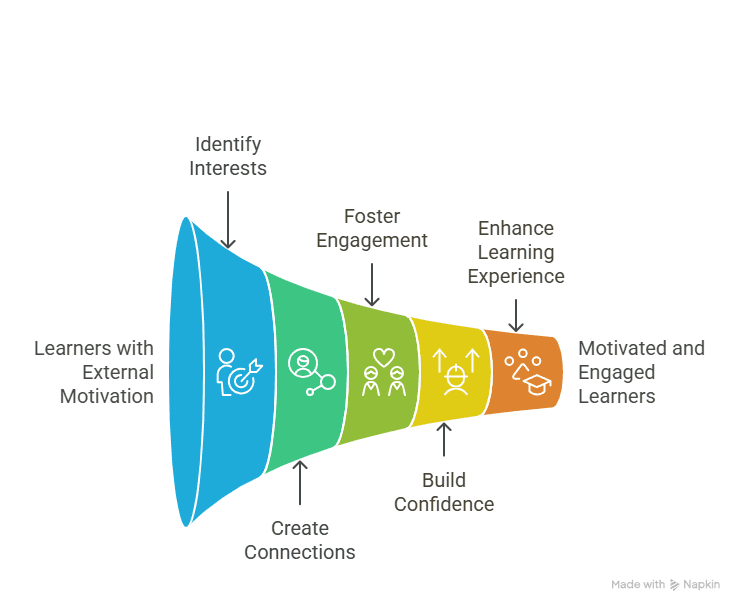
Extrinsically motivated
If I were teaching a group of learners, each with different motivations for learning English, I think the most challenging ones to engage would be those who are studying English out of necessity rather than personal interest. These learners might be in class because they’re required to be—for example, by an employer, a government program, or even pressure from family or community expectations. Their presence in the classroom doesn’t always come from a strong internal desire to learn the language, and that can affect how they engage with lessons and with the learning process overall.
Intrinsically motivated
In contrast, learners who are motivated by clear, self-chosen goals—such as preparing for a university course, travelling, building professional skills, or settling more confidently in an English-speaking country—usually have a more focused attitude. Their motivation tends to carry them through the more difficult or less interesting parts of the course because they can see how each step contributes to a bigger goal. I imagine that working with learners who are internally motivated would feel more straightforward, since their personal drive often makes them more open to taking risks and staying committed.
Motivational challenge
However, for those who feel “forced” to learn, the challenge is different. They might attend class, but their participation could be minimal. They may seem distracted, resistant to pair work, or unwilling to practise speaking. Sometimes, their body language or tone can reflect a sense of disconnection. As a new teacher, I know this could feel discouraging at first, but I also believe that these learners are not unmotivated—they just haven’t yet found a personal connection to the language.
Helping learners to find their own reasons
Through what I’ve read and discussed so far on the CELTA course, I’m starting to see that part of my job is not just to deliver language content, but also to help learners find their own reasons to care about it. If someone doesn’t want to learn English for work, maybe they’d enjoy being able to watch English movies without subtitles. If they feel nervous about speaking, perhaps they’d benefit from activities that build their confidence gradually in low-pressure settings. Even helping someone feel more independent when shopping or visiting the doctor can be an incredibly powerful motivator.
Classroom environment
I also think classroom atmosphere plays a big role. If learners feel respected, included, and safe to make mistakes, they’re more likely to open up over time—even if they didn’t arrive with high motivation. I want to create that kind of environment: one that’s not only about language input, but also about emotional safety, curiosity, and small personal victories.
In the long term, I believe that by being patient, observant, and flexible, I can learn how to work with learners of all motivation levels. Everyone has the potential to enjoy learning—they just need to feel that what they’re learning matters to them. And sometimes, all it takes is one meaningful moment of connection to turn things around.
To your CELTA journal
Think about what motivates your students to learn.
Write in your CELTA journal about your experiences with adult learners and what keeps them engaged. Share specific examples of strategies you have used or observed, such as interactive activities, real-life connections, or personalized feedback. Also, include any tips or insights on maintaining motivation in the classroom.
- Next lesson: Context for learning and teaching English
- Previous lesson: Cultural, linguistic and educational backgrounds
